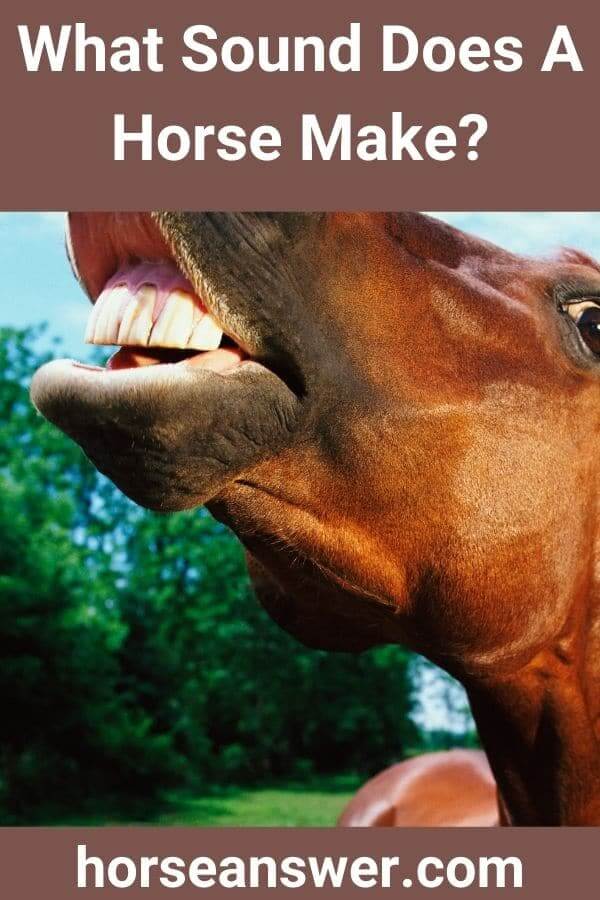What Sound Does A Horse Make? (Find Out!)
The other day while out walking with my dog, we passed a big horse field where they were all shouting and yelling and being very vocal to each other.
They were making a huge array of noises and sounds that I’d never heard a horse make before, and never realised they had such a wide spectrum of sounds.
I realized I wasn’t really sure what noises horses made to begin with as I’d never much thought about it, so I decided to look into it.
So, what noise does a horse make?
A horse makes a neighing sound, which we call a whinny or a bray. It’s one of the more difficult animal sounds to describe, compared to, say, sheep or cows. In the English-speaking world, in general, the noise a horse makes is described as a neigh or a whinny.
Horses also make other noises, and not just with their mouths.
Their galloping is usually very loud on the right surface, and this is probably the more iconic noise that they make.
Everyone can recognise a horse gallop, but there are actually a lot of noises that horses make that you wouldn’t necessarily recognize.
So, let’s break down horse noises and why they make different sounds.
How do you write the sound of a horse?
The way to write the sound a horse makes is simply ‘neigh’.
This is the most widely used in English, and the most recognizable.
Everyone knows that horses make a neighing sound, and I would expect for most of us, even reading the word sets of the sound blaring in our heads.
The word whinny is also commonly used, but it is not entirely clear where this came from.
Some think it derives from the word ‘whine’, suggesting horses make a whining sound.
In any case, nowadays, people generally mean the actual process of a horse making a noise when they say whinny; i.e., the shaking its head, opening its mouth, and essentially yelling.
This is also called a bray.
The word neigh is the actual noise itself.
This is a slightly artificial distinction, but that is essentially what is agreed upon.
You would say a horse ‘makes a neighing sound’, but you would say simply ‘a horse brays/whinnies’.
So, a little bit more complicated than you might think!
So, why do horses bray, whinny or neigh in the first place?
Why does a horse neigh?
There are many reasons, depending on the circumstances.
The simple, general reason why horses bray and whinny is communication.
Horses are herd animals, so they have a very keen sense of who is around them, where they are and what they’re doing.
For a herd, by constantly making noises and communicating, they maintain the safety of the herd by keeping in constant contact.
On the other hand, neighs will also indicate specific things.
For example, a horse may excessively bray or whinny if it is uncomfortable for some reason; often, if someone is attempting to climb on them and doing it very slowly or awkwardly, they will become uncomfortable and may begin to neigh.
Overall, though, the point is about getting the attention of others, whether that’s horses or people.
Neighing can be very loud when they want it to be, so it’s a great way to send communications quickly across the herd.
Can a horse cry?
In terms of shedding tears, horses certainly can do, although not as emotional response.
However, they can also make something approaching a crying sound if they are in great enough distress.
Horses that are in tremendous pain will cry and scream, but usually only if it’s something fatally serious.
This could certainly be called a cry, although it might be closer to a yell or scream. In any case, it’s not a pleasant sound to hear.
So, no, horses will not cry from their eyes as an emotional response to something—only if their tear ducts are blocked.
But they can certainly make a crying sound under the right circumstances.
What sounds do horses make when scared?
Knowing what to listen out for when a horse is scared is really important.
You need to be able to understand and communicate with your horse, and be able to appreciate its needs.
Horses are instinctively nervous creatures, and building up trust with them will take a while.
To be perfectly honest, a good rule of thumb is that if a horse is making excessive noise at any time, the likelihood is its scared or nervous.
The quieter they are, the less nervous they must be.
If you’re trying to mount or clean your horse or in any way care for it, if it is making excessive noise, you should back off for a moment.
That said, when scared, they will usually snort and whip their head around a lot, if it’s simple nerves.
If they’re actively afraid of something, they may make louder neighing and whinnying noises, like usual.
So, the neighing and the galloping are without doubt the most recognizable.
However, horses actually make a lot more noises than that, and a lot you probably wouldn’t recognize at all.
They’re often used for sound effects on movies, even for monsters! In any case, a horse’s neigh is called a whinny or a bray, and the actual sound is what we write as ‘neigh’.
When a horse makes a noise with its mouth, we call that a whinny or bray.
